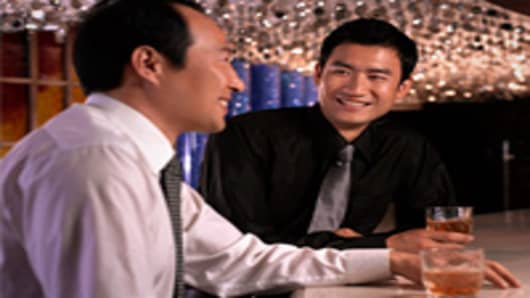China is likely to drive global growth for years to come and businesses across the globe are positioning themselves for the doubling of the Chinese middle class in the next 20 years.
The big headlines have been grabbed by China’s demand for raw materials like oil and metals. But companies from Europe and the US are keen to unlock the door to an ever more affluent Chinese consumer.
One area that could see huge growth in demand is spirits. Global giants like Pernod Ricard and Diageo are attempting to get a significant foothold in the market and convince Chinese consumers to upgrade their drinking habits to premium liquor.
"At present imported spirits only account for at most 1 percent of the total market in China," Kathie Wang, communications director at Pernod Ricard China, said. "This provides great opportunities for the further growth of imported spirits in the country where the economy will continue to grow much faster than others and consumers are becoming increasingly sophisticated."
Archrival Diageo also sees huge potential in the vast and very diverse Chinese market and hopes that the market will develop in a similar way to other established economies.
“The opportunity in China is huge, the market is huge and very diverse with consumers in the mega-cities of Shanghai and Beijing having very different tastes and needs than more rural areas to the north and west," said Andy Fennel, chief marketing officer at Diageo.
The hope for Diageo, Pernod Ricard and others is that as Chinese consumers become richer they will consume more expensive, premium brands and a lot of money is being spent convincing people to move up the value chain.
Pay More for the Premium
Fennel argues that big spending on marketing and advertising in China will convince more and more consumers to aspire to premium brands like Johnnie Walker Scotch.
His plan for China is the same as it is in America, Europe or Africa, driving consumers up the chain to pricier, higher-quality drinks.
That means convincing consumers to pay more for a better experience — what the industry calls "premiumization." In the case of Diageo, this could mean getting someone who currently drinks Johnnie Walker Red Label to drink Black Label and ultimately, Blue Label.
"In developing markets we see more people consuming international spirits verses local spirits as they become wealthier," Fennel said. "This trend has contributed to about a third of our growth between 2003 and 2009."
The Battle to Be No. 1
With only one percent of the market currently going to international spirit brands in China there would appear to be enough growth opportunities for everyone.
The domestically distilled Baijiu is widely regarded as the most popular spirit in China, but Diageo and Pernod Ricard, rivals in every major market on the planet, are fighting hard for dominance of the high-end market.
Pernod Ricard claims to be number one in Scotch with Chivas Regal, vodka with Absolut and high-end cognac with Martel and Martell Cordon Bleu.
Diageo has some catching up to do, but are still doing well. Scotch sales growth in China has been four times as strong as that in Brazil and Fennel said it is possible Scotch volumes could double or even triple over time.
The key to growth and pushing customers up the value chain is the same in China as America or Europe, he said.
“Being in the right bars in Shanghai, advertising online, on TV, in print and billboards is vitally important in China as it is in America or Europe," he added.
Pernod Ricard has the better product portfolio in China given China’s preference for Cognac over Scotch, according to Matthew Webb, an analyst at JPMorgan.
Picking the Right Partner
Diageo hopes to improve its position via recent partnership agreement with a local spirits group. The UK-listed group has formed a partnership in China with Shui Jing Fang, a Chinese white spirits company, which makes them one of the leading premium Baijiu companies.
"This is an important and unusual transaction, providing as it does for the increased involvement of a global company in a category with unique heritage," Diageo CEO Paul Walsh said. "Diageo now has a valuable opportunity to build a substantial presence in super-premium Chinese white spirits and it will enable us to bring one of the leading Chinese white spirits brands to international markets."
Ian Shackleton who covers the sector for Nomura, is bullish on the prospects for international spirit sales in China.
"We see huge upside for international spirits in China," Shackleton said. "We estimate growth will be 2.5 times GDP growth. With growth set to hit 10 percent, that is 25 percent revenue growth per annum."
Shackleton agreed with Webb hat Pernod has the lead in China, but is confident Diageo has the correct strategy to catch up.
CNBC.com Slideshows:




